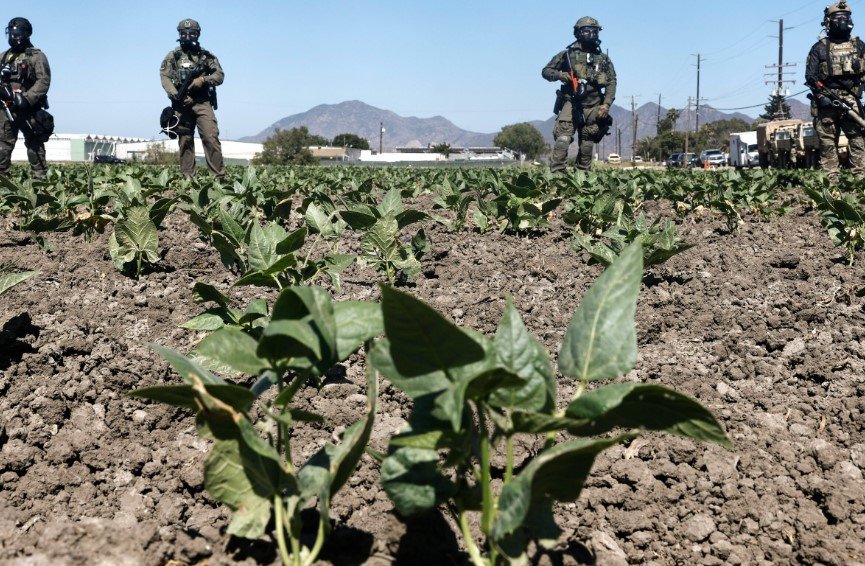South Korea has reached an agreement with the United States to release hundreds of its citizens detained during a major immigration raid at a Hyundai plant in Georgia. The deal allows for the swift return of the workers, easing tensions between the two allies amid ongoing trade talks and concerns over foreign investments.
Details of the Immigration Raid
Federal agents from Immigration and Customs Enforcement raided the Hyundai battery plant construction site in Bryan County, Georgia, on September 5, 2025. They detained 475 workers suspected of illegal employment, with more than 300 identified as South Korean nationals.
The operation targeted a facility building batteries for electric vehicles, a key project in Hyundai’s multibillion-dollar investment in the US. Officials stated the raid aimed to enforce immigration laws and protect American jobs.
Many detainees were mechanics and technicians on short-term visas not permitting work. Video footage showed workers in handcuffs and ankle chains, sparking outrage in South Korea.
The raid disrupted construction at the plant, which is part of a larger partnership between Hyundai and LG Energy Solution. This site represents one of the largest foreign investments in Georgia, valued at over $7.6 billion.

South Korea’s Response and Diplomatic Efforts
South Korea’s government acted quickly to support its citizens. President Yoon Suk Yeol’s chief of staff announced plans to send a chartered plane for their return once paperwork clears.
Foreign Minister Cho Hyun is set to visit the US on September 9, 2025, to discuss the matter further. Seoul has pushed for better visa systems to avoid future issues.
Officials in Seoul expressed concerns about the treatment of detainees and potential harm to bilateral relations. They pledged all-out efforts to protect nationals and investors.
The agreement highlights the strong alliance between the two nations, built on decades of military and economic ties. South Korea has invested heavily in US manufacturing to strengthen supply chains.
Here are key points from South Korea’s statements:
- Demand for fair treatment and quick release of detainees.
- Calls to reform visa processes for skilled workers.
- Emphasis on maintaining strong US investments despite the raid.
US Officials Defend the Operation
President Donald Trump defended the raid in a social media post on September 7, 2025, urging foreign companies to hire American workers. He stressed respect for US immigration laws while welcoming legal talent.
Border official Tom Homan indicated more workplace raids are coming. He argued that employers hire undocumented workers to cut costs and undercut US citizens.
The Department of Homeland Security described the action as essential to stop visa exploitation. Agents executed a search warrant as part of a criminal probe into hiring practices.
Trump’s administration has ramped up immigration enforcement since his return to office in 2025. This aligns with promises to prioritize American jobs in key industries like automotive manufacturing.
Impact on Trade and Investments
The raid comes during sensitive US-South Korea trade negotiations. South Korea has committed billions to US projects to offset tariffs and boost alliances.
Experts worry such actions could chill foreign investments. Georgia officials have promoted the Hyundai plant as a job creator, expecting thousands of positions once operational.
Recent data shows foreign direct investment in the US reached $5 trillion in 2024, with South Korea among top contributors in tech and autos.
The incident echoes past raids, like those in 2019 under Trump’s first term, which targeted food processing plants.
This table outlines major US-South Korea investment projects:
| Project | Location | Investment Amount | Expected Jobs |
|---|---|---|---|
| Hyundai EV Battery Plant | Georgia | $7.6 billion | 8,500 |
| Samsung Chip Factory | Texas | $17 billion | 3,000 |
| SK Hynix Semiconductor | Indiana | $3.9 billion | 1,000 |
Broader Implications for Workers and Policy
Workers at the site described chaos during the raid, with many fleeing or hiding. One anonymous employee noted most detainees were contractors installing equipment.
The event raises questions about visa programs for skilled foreign workers. Programs like H-1B visas face scrutiny amid calls for reform.
Advocates argue for balanced policies that protect jobs while allowing global talent. Labor groups praise the raid for addressing exploitation.
In 2025, US unemployment stands at 4.2 percent, with manufacturing sectors seeking skilled labor amid shortages.
As this story develops, readers can share their thoughts in the comments below or spread the word on social media to keep the conversation going.
